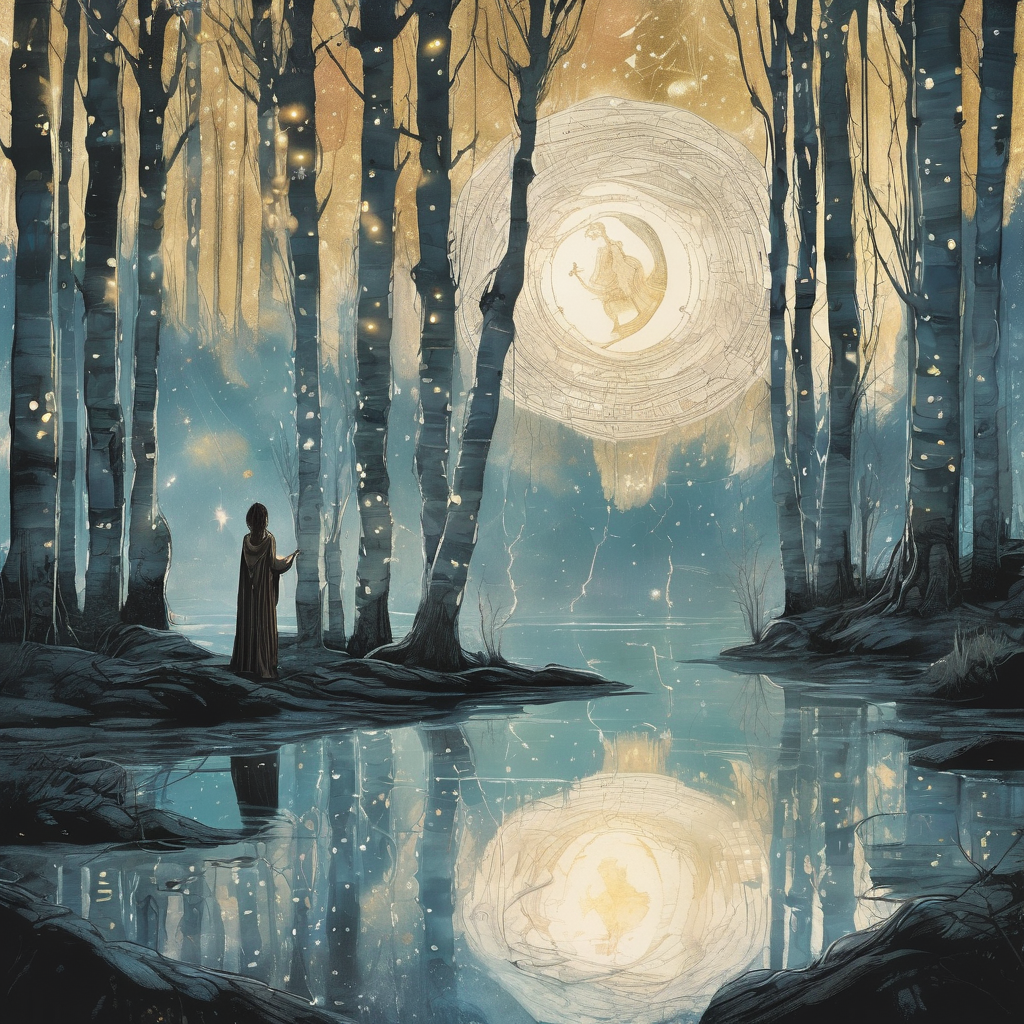The parchment cracked beneath Isla’s fingertips as she unrolled her father’s final map, its edges brittle with age and secrets. Outside the cottage window, the village bells had fallen silent three days ago—not broken, but forgotten, like so many things lately.
“Another one’s gone,” her neighbor Matthias whispered through the door. “Old Henrik can’t remember his wife’s name. Keeps calling her ‘the woman who makes good bread.’”
Isla studied the map’s impossible geography. Her father had been the royal cartographer before the curse took hold, before their kingdom began losing pieces of itself like a tapestry unraveling thread by thread. The map showed places that no longer existed on any other chart: the Singing Cliffs where lovers once pledged eternal devotion, the Mirror Lakes that reflected not faces but dreams, the Golden Grove where the first royal wedding had been celebrated centuries ago.
Most peculiar of all, at the map’s center, her father had drawn a blank space where the capital should be. Above it, in his careful script: “Here lies what we have misplaced.”
The kingdom’s name had been the first casualty. One morning, the royal heralds had awakened unable to proclaim it. The scribes found their records inexplicably smudged. Even the ancient songs sung by traveling minstrels contained only humming where the syllables should be. People began referring to their homeland simply as “here” or “this place we call home.”
Isla traced the map’s mysterious paths with her finger, feeling warmth pulse beneath the ink. Her father had always insisted that maps were living things, breathing documents that connected the cartographer’s heart to the land itself. She’d dismissed it as romantic nonsense until now, when the paper seemed to whisper secrets only she could hear.
Following an impulse she couldn’t name, Isla packed the map along with her father’s compass and set out toward the blank space at the kingdom’s heart. The roads proved treacherous—not from bandits or wild beasts, but from their own instability. Paths she remembered from childhood wandered in circles or ended abruptly at meadows that insisted they had always been there.
She met other travelers along the way: a merchant who’d forgotten what goods he carried, though his wagon remained heavy with invisible cargo; a knight errant seeking a quest he couldn’t quite recall; twin sisters searching for their ancestral home, following only the scent of their grandmother’s rose garden.
“We’re all looking for the same thing,” the knight observed as they shared an evening fire. “The piece that makes everything else make sense.”
On the fourth day, Isla’s compass began spinning wildly before pointing toward a grove of silver birch trees that shimmered like moonlight. The map grew warm against her chest as she approached, and suddenly she understood: the blank space wasn’t empty at all. It was full of everything they’d lost, compressed into a single point like a heart that had forgotten how to beat.
She stepped into the grove and found herself in a place that existed between memory and reality. Here stood the original castle, built of cloud-white stone and draped in banners bearing the kingdom’s true name—letters that danced just beyond recognition. Here lived the accumulated dreams of generations: first loves and wedding vows, lullabies sung to sleeping children, the laughter of harvest festivals and the solemn prayers of winter ceremonies.
At the grove’s center sat an ancient woman weaving at a loom, her threads spanning from earth to sky. Her eyes held the deep green of old forests.
“The mapmaker’s daughter,” she said without looking up. “Your father sent you.”
“Who are you?”
“I am what remains when everything else is forgotten. The keeper of the kingdom’s true name.” Her fingers paused in their weaving. “But I grow tired, child. The threads become heavy. Soon I too will forget, and then this place will fade entirely.”
Isla understood then why her father had drawn the map, why he’d left her this inheritance of secrets. “You need someone to remember for you.”
“Not remember. Become.” The woman’s eyes met hers. “To be the living map that connects all the scattered pieces. To carry the kingdom’s name not in your mind, but in your bones.”
The choice crystallized before her: return to a world slowly forgetting itself, or become the thread that could weave it back together. Isla thought of Henrik calling his wife “the woman who makes good bread”—loving but lost. She thought of the knight’s empty quest, the merchant’s invisible cargo, the twins following nothing but scent and hope.
She stepped forward and placed her hands on the loom. The moment her fingers touched the threads, the kingdom’s true name blazed through her like sunlight through crystal: Valdris, land of the singing stones, realm of the heart’s compass. She felt every village and valley, every stream and mountain peak, every beating heart within the borders singing itself back into existence.
When she opened her eyes, she stood alone in the grove, but she was no longer simply Isla. She was the map itself, the living connection between all things. As she walked back toward civilization, flowers bloomed in her footsteps, and the roads remembered their true paths.
The village bells began to ring again as she approached, and Henrik embraced his wife, whispering “Marta, my beloved Marta” with tears in his eyes. The merchant discovered his wagon full of silk and spices, the twin sisters found their grandmother’s house exactly where they’d left it, and the knight rode off toward a quest that burned bright and clear in his memory.
That evening, as the sun set over the kingdom of Valdris—a name that rang out from every throat with joyous recognition—Isla sat in her father’s cottage, carefully drawing a new map. This one showed not just the geography of land, but the topology of dreams restored, the cartography of a heart that remembered its true name.

Leave a Reply